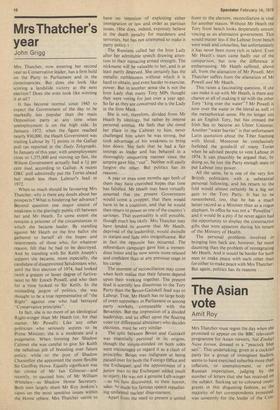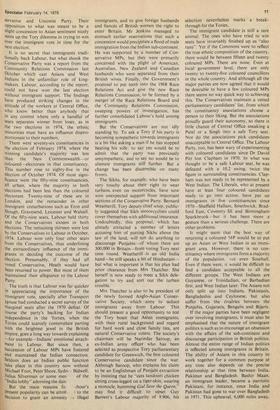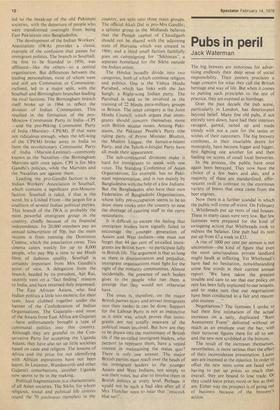The Asian vote
Amit Roy Mrs Thatcher must regret the day when she promised to appear on the BBC television programme for Asian viewers, Nai Zindagi Naya Jeevan, dressed in a "peacock blue sari". This undertaking, given at a cocktail party for a group of immigrant leaders. seems to have exercised suburbia more than inflation, or unemployment, or even Russian imperialism, judging by the number of letters that she has received on the subject. Sucking up to coloured immlgrants in this disgusting fashion, so the majority of her correspondents protested. was unseemly for the leader of the con
servative and Unionist Party. Their Opposition to what was meant to be a Slight concession to Asian sentiment nicely sums up the Tory dilemma in trying to win over the immigrant vote in time for the next election.
It is no secret that immigrants traditionally back Labour, but what shook the Conservative Party was a report from the Community Relations Commission last October which cast Asians and West Indians in the unfamiliar role of kingmakers. Labour, according to the report, could not have won the last election Without immigrant support. The findings have produced striking changes in the attitude of the workers at Central Office, Who know better than anybody that in any contest where only a handful of seats separates winner from loser, as in the two elections in 1974, the ethnic minorities must have an influence disproportionate to their numbers.
There were seventy-six constituencies in the election of February 1974, where the winning candidate's majority was less than the New Commonwealth—or coloured—electorate in that constituency. This number rose to eighty-five in the election of October 1974. Of most significance were the fifty-nine constituencies, all urban, where the majority in both elections had been less than the coloured electorate. Twenty-nine of these are in London, and the remainder in other immigrant conurbations such as Eton and Slough, Gravesend, Leicester and Walsall. Of the fifty-nine seats, Labour held thirty and the Conservatives sixteen in both elections. The remaining thirteen were lost by the Conservatives to Labour in October, 1974. Labour won only four other seats from the Conservatives, thus underlining the extraordinary influence of the immigrants in deciding the outcome of the election. Presumably, if they had all voted Conservative, Heath would have been returned to power. But most of them Maintained their allegiance to the Labour Party.
The truth is that Labour was far quicker 41 appreciating the importance of the Immigrant vote, specially after Transport House had conducted a secret survey of the Marginal seats after the 1970 defeat. Of Course the party's backing for Indian Independence in the 'forties, when the Tories could scarcely contemplate parting With the brightest jewel in the British empire, goes a long way towards explaining —for example—Indians' emotional attachment to Labour. But since then, a sUccession of Labour MPs have fostered and maintained the Indian connection. Seldom does an Indian public function take place in this country now without Michael Foot, Peter Shore, Sydni., Bidwell,
Julius Silverman or some men of the 'India lobby" adorning the dais But the main reasons fo, ibour's Present popularity can be attrib to the decision to grant an amnesty illegal immigrants, and to give foreign husbands and fiancés of British women the right to enter Britain. Mr Jenkins managed to stomach earlier reservations that such a concession would precipitate a flood of male immigration from the Indian sub-continent. He was supported by a number of Conservative MPs, but they were primarily concerned with the plight of American, Australian, New Zealand and Canadian husbands who were separated from their British wives. Finally, the Government's proposal to put teeth into the 1968 Race Relations Act and give the new Race Relations Commission, to be formed by a merger of the Race Relations Board and the Community Relations Commission, sweeping powers of investigation, has further consolidated Labour's hold among immigrants.
But the Conservatives are not idly standing by. To ask a Tory if his party is becoming sympathetic towards immigrants is a bit like asking a man if he has stopped beating his wife: to say yes would be to admit that the party was previously unsympathetic, and to say no would be to alienate immigrants still further. But a change has been discernible on many fronts.
The Sikhs, for example. who have been very touchy about their right to wear turbans, even on motorcycles, have now won unexpected support from important sections of the Conservative Party. Bernard Weatherill, Tory deputy chief whip, publicly suggested that Sikh motorcyclists could cover themselves with additional insurance. Undoubtedly, this proposal, which has already attracted a number of letters accusing him of putting Sikhs above the law of the land, will not do anything to discourage Punjabis—of whom there are 300,000 in Britain—from voting Tory next time round. Weatherill is an old India hand—he still speaks a bit of Hindustani— but what is important is that his plan had prior clearance from Mrs Thatcher. She herself is now ready to meet a Sikh delegation to try and, sort out the turban trouble.
Mrs Thatcher is also to be president of the newly formed Anglo-Asian Conservative Society, which aims to seduce immigrants away from Labour. This should present a good opportunity to test the Tory boast that Asian immigrants, with their rural background and regard for hard work and close family ties, are natural Conservative voters. The society's chairman will be Narindar Saroop, an ex-Indian army officer who has been selected as prospective Tory parliamentary candidate for Greenwich, the first coloured Conservative candidate since the war. Although Saroop, who explains his claim to be an Englishman of Punjabi extraction by insisting that he "eats tandoori chicken sitting cross-legged on a tiger-skin, wearing a monocle, humming God Save the Queen,may find it difficult to upset Guy Barnett's Labour majority of 9,906, his
selection nevertheless marks a breakthrough for the Tories.
The immigrant candidate is still a rare animal. The ones who have tried to win seats have invariably finished up as "also rans". Yet if the Commons were to reflect the true ethnic composition of the country, there would be between fifteen and twenty coloured MPs. There are none. Even at local government level, there are only twenty to twenty-five coloured councillors in the whole country. And although all the major parties are now agreed that it would be desirable to have a few coloured MPs there seems no way quick way to achieving this. The Conservatives maintain a vetted parliamentary candidates' list, from which the constituency associations choose a person to their liking. But the associations proudly guard their autonomy, so there is little chance of Central Office sneaking a Patel or a Singh into a safe Tory seat. Nor do the associations pick candidates unacceptable to Central Office. The Labour Party, too, has been wary of experimenting with coloured candidates since Dr David Pitt lost Clapham in 1970. In what was thought to be a safe Labour seat, he was defeated with a 10.2 swing, twice the figure in surrounding constituencies. Clapham was not ready to be represented by a West Indian. The Liberals, who at present have at least four coloured candidates ready to go into action, have put up immigrants in five constituencies since 1970—Sheffield Hallam, Smethwick, Bradford East, Coventry SE and Birmingham Sparkbrook—but it has been more a gesture than a serious challenge. There are other problems.
It might seem that the best way of returning a coloured MP would be to put up an Asian or West Indian in an immigrant area. However, there is no constituency where immigrants form a majority of the population, not even Southall. Even if there were, it would be difficult to find a candidate acceptable to all the different groups. The West Indians are Guyanese, or Trinidadian, or Barbadian first, and West Indian later. The Asians not only split up into Indians, Pakistanis, Bangladeshis and Ceylonese, but also suffer from the rivalries between the Punjabis. Gujaratis, Bengalis and Bijaris.
If the major parties have been negligent over involving immigrants, it must also be emphasised that the nature of immigrant politics is such as to encourage an obsession with the affairs of the sub-continent and discourage participation in British politics. Almost the entire range of Indian politics is reflected among immigrants in Britain. The ability of Asians in this country to work together for a common purpose at any time also depends on the precise relationship at that time between India, Pakistan and Bangladesh. Bashir Maan, an immigrant leader, became a patriotic Pakistani, for instance, once India and Pakistan had gone to war over Bangladesh in 1971. This upheaval, 6,000 miles away, led to the break-up of the old Pakistani societies, with the departure of people who were transformed overnight from being East Pakistanis into Bangladeshis.
The development of the Indian Workers' Association (IWA) provides a classic example of the confusion that passes for immigrant politics. The branch in Southall, the first to be founded in 1956, was affiliated—like the others—to a central organisation. But differences between the leading personalities, most of whom were and still are Communist or Communistinclined, led to a major split, with the Southall and Birmingham branches leading the rival factions. The Birmingham branch itself broke up in 1964 to reflect the division of Indian Communists. This resulted in the formation of the proMoscow Communist Party in India—CPI —and the pro-Peking Communist Party of India (Marxist)—CPI(M). If that were not ridiculous enough, when the left-wing of the CPI(M) broke away in India to form the revolutionary Communist Party of India (Marxist-Leninist)—commonly known as the Naxalites—the Birmingham Marxists split once again. CPI is for Mrs Gandhi's policies, while the Marxists and the Naxalites are against them.
Leading the pro-Gandhi faction is the Indian Workers' Association in Southall, which contains a significant pro-Moscow faction. Southall is ruled, if that is the word, by a United Front—the jargon for a coalition of several Indian political parties. This branch of the IWA is probably the most powerful immigrant group in the country, chiefly because of its financial independence. Its 20,000 members pay an annual subscription of 50p, but the main income is from running the Dominion Cinema, which the association owns. This cinema caters weekly for up to 8,000 people, who pay 90p a time to see Hindi films of dubious quality. Southall is certainly important from Mrs Gandhi's point of view. A delegation from the branch, headed by its president, Ajit Rai, recently went on a "fact finding" mission to India, and have returned duly impressed.
The East African Asians, who find Indian politics a little too esoteric for their taste, have clubbed together under the banner of the Confederation of Indian Organisations. The Gujaratis—and most of the Asians from East Africa are Gujarati —have unfortunately brought a type of communal politics into this country. Although they are grateful to the Conservative Party for accepting the Uganda Asians, they have also set up little societies based on caste and religion. The lessons of Africa and the price for not identifying with African aspirations have not been learnt. In Leicester, Wandsworth and other Gujarati conurbations, another Uganda now seems to be in the making.
Political fragmentation is a characteristic of all Asian societies. The Sikhs. for whom religious, social and political life centres round the 70 gurdwaras (temples) in the
country, are split into three main groups. The official Akali Dal is pro-Mrs Gandhi; a splinter group in the Midlands believes that the Punjab capital of Chandigarh should not be shared with the adjoining state of Haryana which was created in 1966; and a third small faction faithfully goes on campaigning for "Sikhistan", a separate homeland for the Sikhs outside the Indian union.
The Hindus broadly divide into two categories, both of which combine religion and politics. One is the Vishya Hindu Parishad, which has links with the Jan Sangh, a Right-wing Indian party. The Parishad is said to be involved in the training of 22 Hindu para-military groups in Britain. The other category is the Joint Hindu Council, which argues that immigrants should concern themselves more with British secular issues. Among Pakistanis, the Pakistan People's Party (the ruling party of Prime Minister Bhutto), the Muslim League, the Jamait-e-lslami Party, and the Tehrik-e-Istiqlal Party have all made their appearance.
The sub-continental divisions make it hard for immigrants to speak with one voice. The Standing Conference of Asian Organisations, for example, has no Pakistani representation, and is run mainly by Bangladeshis with the help of a few Indians. But the Bangladeshis also have their own Federation of Bangladeshi Organisations, whose lofty pre-occupation seems to be Ao draw more cooks into the country to ease the shortage of catering staff in the curry restaurants.
It is difficult to escape the feeling that immigrant leaders have signally failed to encourage the younger generation of Asians and West Indians—one must not forget that 44 per cent of so-called immigrants are British born—to participate fully in British life. The.argument is that so long as there is discrimination and prejudice, immigrant organisations must fight for the right of the minority communities. Almost incidentally, the presence of such bodies gives to the people who run them a prestige that they would not otherwise have.
The onus is, therefore, on the major British parties to try and attract immigrants into their ranks. It can be done. Support for the Labour Party is not as instinctive as it once was, which proves that immigrants are not totally unaware of the political issues involved. But how are they to be drawn into the mainstream of British life if the so-called immigrant leaders, who purport to represent them, have a vested interest in maintaining the status quo? There is only one answer. The major British parties must reach over the heads of the immigrant leaders to the younger Asians and West Indians, not simply to win their votes, but also to involve them in British politics at every level. Perhaps it would not be such a bad idea after all if Mrs Thatcher were to wear that "peacock blue sari".




































 Previous page
Previous page